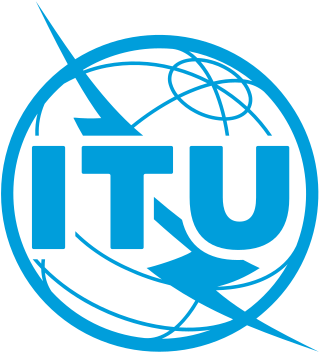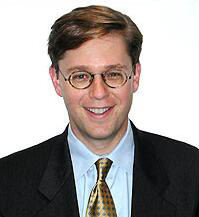
The European Conference of Postal and Telecommunications Administrations (CEPT) was established on June 26, 1959, by nineteen European states in Montreux, Switzerland, as a coordinating body for European state telecommunications and postal organizations. The acronym comes from the French version of its name Conférence européenne des administrations des postes et des télécommunications.

The International Telecommunication Union is a specialized agency of the United Nations responsible for many matters related to information and communication technologies. It was established on 17 May 1865 as the International Telegraph Union, making it the first international organization. Doreen Bogdan-Martin is the Secretary-General of ITU, the first woman to serve as its head.

The National Telecommunications and Information Administration (NTIA) is an agency of the United States Department of Commerce that serves as the President's principal adviser on telecommunications policies pertaining to the United States' economic and technological advancement and to regulation of the telecommunications industry.

Kevin Jeffrey Martin is a lobbyist for Facebook and former member and Chairman of the U.S. Federal Communications Commission (FCC), an independent agency of the United States government. He was nominated to be a commissioner by President George W. Bush on April 30, 2001, and was confirmed on May 25, 2001. On March 16, 2005, President Bush designated him as FCC chairman, to replace Michael K. Powell. President Bush renominated Martin to a new five-year term on the Commission on April 25, 2006, and he was reconfirmed by the U.S. Senate on November 17, 2006. In January 2009, Martin announced that he would step down from the FCC and join the Aspen Institute, as a senior fellow in the think tank's Communications and Society Program. He since became a partner with the law firm Squire Patton Boggs LLP, and was hired as Facebook's head of U.S. Public Policy.

Spectrum management is the process of regulating the use of radio frequencies to promote efficient use and gain a net social benefit. The term radio spectrum typically refers to the full frequency range from 1 Hz to 3000 GHz that may be used for wireless communication. Increasing demand for services such as mobile telephones and many others has required changes in the philosophy of spectrum management. Demand for wireless broadband has soared due to technological innovation, such as 3G and 4G mobile services, and the rapid expansion of wireless internet services.
Richard E. Wiley is an American attorney and former government official. He served as chairman of the Federal Communications Commission (FCC) from March 8, 1974 to October 12, 1977. A member of the Republican Party, he supported increased competition and lower regulations in the communications sector.

The James H. and Mary B. Quello Center for Telecommunication Management & Law is a research center at Michigan State University in East Lansing, Michigan. Part of the Department of Media and Information at the College of Communication Arts and Sciences, the Quello Center is dedicated to original research on issues of information and communication management, law and policy. It is named for former Federal Communications Commission chairman James H. Quello.

Johannes M. Bauer is the Quello Chair for Media and Information Policy in the Department of Media and Information at Michigan State University, East Lansing, Michigan. He also serves as the Director of the James H. and Mary B. Quello Center at Michigan State University.
Ralph B. Everett was President and Chief Executive Officer of the Joint Center for Political and Economic Studies, a leading African American think tank, from 2007 until 2013.
The Columbia Institute for Tele-Information (CITI) is one of several research centers for Columbia Business School, focusing on strategy, management, and policy issues in telecommunications, computing, and electronic mass media. It aims to address the large and dynamic telecommunications and media industry that has expanded horizontally and vertically drive by technology, entrepreneurship and policy.

Hamadoun Ibrahim Touré of Mali was Secretary General of the International Telecommunication Union (ITU), the specialized agency of the United Nations dedicated to information and communication technologies (ICTs), from 2007 to December 2014. He was re-elected for a second four-year term in 2010. Since 2007, he has worked to fulfil ITU's mandate to 'connect the world' and help achieve the Millennium Development Goals.

Malcolm Johnson is a British civil servant. He is the Deputy Secretary-General of the ITU and former Director of the Telecommunication Standardization Bureau (TSB) of the ITU Standardization Sector (ITU-T). He was elected Director by the ITU Plenipotentiary Conference, 2006 in Antalya, Turkey. He took office on 1 January 2007 and was re-elected at the ITU Plenipotentiary Conference 2010. At the ITU Plenipotentiary Conference 2014 in Busan, he was elected to a term as Deputy Secretary-General, and at the 2018 ITU Plenipotentiary Conference in Dubai, he was reelected to a second term.
The Global Standards Collaboration (GSC) started life as The "Inter-regional Telecommunications Standards conference (ITSC) in 1990. This was an initiative of the T1 Committee of the United States who invited the other founding partner organizations ITU-T, ETSI and the Japanese TTC to the first ISC Meeting in Fredericksburg, VA. The goal was set by the “spirit of Melbourne”, stemming from a CCITT Plenary Assembly, to find a way of co-operation between Participating Standards Organizations (PSOs) from different regions of the world in order to facilitate global standardization within the ITU. The ITSC focussed its work on fixed telecommunications networks.
The Indian Telecommunications Service, widely known as ITS, and earlier known as 'Telegraph Engineering Service Class I' is one of the gazetted central engineering services officer under Group 'A' of the executive branch of the Government of India. The appointment to this service is done through Combined Engineering Services Exam held every year by Union Public Service Commission (UPSC) of India. The service was created to meet the technological needs of the government in areas related to telecommunications. The Department of Telecommunications (DOT) had been managed for years by the officers of this permanent cadre, called the Indian Telecommunications Service (ITS).The officers of ITS work under restrictions and rules of Central Engineering Services (Conduct) rules.

The Asia Pacific Telecommunity (APT) was founded on the joint initiatives of the United Nations Economic and Social Commission for Asia and the Pacific (UNESCAP), and the International Telecommunication Union (ITU).

Steven Lett is a former American diplomat and current chief executive of the International Cospas-Sarsat Programme in Montreal, Quebec, Canada.

Houlin Zhao was the Secretary-General of the International Telecommunication Union (ITU). He was first elected at the 2014 Plenipotentiary Conference in Busan, and re-elected at the 2018 Plenipotentiary Conference in Dubai. ITU is the specialized United Nations Agency for Information and Communication Technology (ICT), working on promotion, collaboration, and standardization.
Mohamed Ezzedine Mili, was a Tunisian diplomat who served as the Secretary-General of the International Telecommunication Union from 1967 to 1982, including an ad interim tenure from 1967 to 1973.

Doreen Bogdan-Martin is the Secretary-General of the International Telecommunication Union. She was elected at the 2022 ITU Plenipotentiary Conference in Bucharest, and as the first woman in the 157-year history of the ITU to become the Secretary-General. Previously, she was the first woman to become an Elected Official of the ITU, as the Director of the Telecommunication Development Bureau of the ITU.
Richard E. Butler, was an Australian public servant who was the secretary-general of the International Telecommunication Union from 1983 to 1989. He was also its deputy secretary-general from 1974 to 1982, and in an ad interim tenure from 1968 to 1973.













